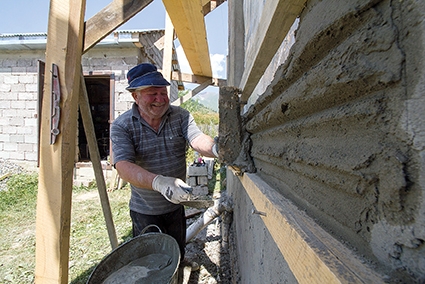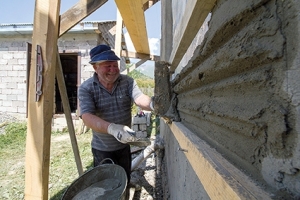Plaster Diary, 2: Etseri, Svaneti
BLOG
First, an aside: I, too, have a War Story to tell, as it’s the 10th anniversary of the events here. I was away in the UK for the whole Russo-Georgian war of August 2018, having bought a 1-way ticket and finding myself unable to return even if I’d had a return ticket: Tbilisi airport was closed. My girlfriend of the time, soon to become my wife, was unreachable by cell phone or landline, so I just had to wait, which was hard indeed. My return was on August 31; within a few hours, getting unspoken signals that I had better not waste time, I proposed to her, and we had our civil ceremony in late November!
Now last week’s house exterior narrative resumes.
Day 5: As work progresses, it’s worth mentioning a couple of important factors in having a major renovation done by live-in craftspeople (usually men) in a village high in the Georgian mountains and 110 km away from the nearest big town’s supplies.
1) You’d better have a surplus of all sorts of unforeseen things at hand, and we’re ideally set up for this, being experienced AND having the village shop in our home amongst other things. Plastic sheeting to cover the windows, tape to fasten it into place, so they won’t get cemented up? Check. Wire, nails, all sorts and sizes of scrap wood for the scaffolding and many other odd needs? Check. Hand and power tools, especially that circular saw? Yes: crowbars for digging holes and digging out nails, spades, shovels and many more essentials. Even four large sheets of second-hand sheet steel, beaten up and a bit rusted, formed the necessary base on which to pour and mix the cement ingredients, the “cake mixing without a pan” miracle which I have written about previously. (But there was only disdain for the ear, eye, lung protection I routinely offer; they used nothing more than work gloves, and as for hard hats, you must be joking if you mention them at all.)
What you DON’T have must be either bought or made; either is possible, depending on materials and skills at hand. An example is the rail-guided form used to make the beautiful decorative cement bits under each of our large windows. My main craftsman sat down and made this entirely from what we had: bits of scrap sheet aluminum from the roof repairs of some years ago, cut with tin snips, and the aforementioned scrap wood. As he reapplied this over several hours, using successively thinner coats of cement, the design sharpened up to its final magnificent form. Other things, such as paint coloring and wood glue, simply must be fetched from either Mestia (where they’re closer but at their most expensive) or Zugdidi (4x further away, but cheaper in the long run if you have a carful of shopping, including things not available locally).
3) You’ll be feeding the men three times a day, housing them, watering them with various liquids on demand too, and hope (as is our fortunate case) that they’re not here to drink into a stupor at every opportunity. They would be unlikely to come highly recommended if that were the case, but the differences between our expectations and theirs can still loom gulf-like.
4) It’s vital to establish and maintain a good relationship from start to finish of the several weeks of your time together, which hopefully will end well, all parties satisfied, peace kept, not too much money asked or spent, and even invitations extended to visit their home province of Kakheti for hunting, fishing and more. These latter, if they survive through to the end of the work project, are a good sign that all ended on the best note. If you’re feasting together on-site as well, on average once a day but maybe more, then things in the interim are going smoothly. But, host husband, don’t neglect your wife’s needs for help in all that serving, especially if she’s doing it alone! Unless this is SO far beyond the culture of both of you that it can’t be done, in which case, ignore away, with consequences perhaps obvious.
5) Very important, too, is to keep an eye on weather reports, as this is chiefly an outdoor project, and rain can force delays. At least the sunshine and heat up here aren’t too oppressive compared to the 40 or 45-degree C lowlands, and the evenings cool right down into the bargain…
I’ll likely wrap this up next week, as things are progressing well and the house is slowly being put into its final outside form for the coming decades.
Tony Hanmer has lived in Georgia since 1999, in Svaneti since 2007, and been a weekly writer for GT since early 2011. He runs the “Svaneti Renaissance” Facebook group, now with over 1900 members, at www.facebook.com/groups/SvanetiRenaissance/
He and his wife also run their own guest house in Etseri:
www.facebook.com/hanmer.house.svaneti
By Tony Hanmer












